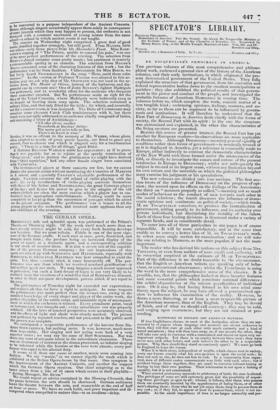THE GERMAN OPERA.
BEETHOVEN'S sole and splendid opera was performed at the Prince's Theatre on Thursday night. Of the work itself much more than we have already written might be said, for every fresh hearing develops new beauties. But we must refrain. Fidelio is one of the most vigorous of the German gruff's. It took root at once, grew, flourished, and brought limit fruit ; the produce being an increased display of the power of music as a dramatic agent, and a corresponding addition to our stock of utitsieal ideas. It is also a severe test of the capabilities of the present German company : for our impressions of this opera are mixed up with Seunonnut and HAITZINGER, especially with Scmosesa, to whom even MALIBRAN was here compelled to yield the pains. Yet, thus teverely tried, it came honourably off. The performance was one from which we received unmixed gratification—it had neither speck nor stain. We may imagine a much nearer approach to perfection, but such a fond dream of fancy is slot very likely to be realized, since the creations of a mind like that of BEE'rnovEN demand, in order to their adequate development, powers allied, if net equal to his own.
The perisrmance of Thursday night far exceeded our expectations, and reatiztai all that we have a right to anticipate. In some respects the performance was more perfect than the former one, owing to the manifest know ledge of' every singer and player of the entire work, the perfect dii-cipline of the entire corps, and admirable style of accompaniment to which the orchestra is trained. Every prominent point, vocal or instrumental, was brought out ; every subordinate one was properly subdued. AIL the laws of musical perspective were accurately observed, and the effects of light and shade were clearly marked. The picture was perfected by repeated touches, and not presented to the public until the process was complete. We anticipated a respectable performance of the heroine from Madame ::;en Iva azniicx, but nothing more. It was, however, much more than respectable. Her singing and her acting were both of a very superior order; we may say the saute of llerr SCHMEZEB. Nor was there any want of adequate talent in the subordinate characters. There was no al ittement of interest as the drama proceeded, no inferior singing to be tolerated while the heroine or the hero were absent ; every performer was equal to his allotted duty. It seems as if from one cause or another, music were coming into fashion. We say "music," as we cannot dignify the trash which is exhibited at the Italian Opera-house by that name. One symptom is the improvement of the Ancient Concerts, and another the support which the German Opera receives. Our chief misgiving as to the !atter arises from a line of ill omen which occurs in their playbills— "Acting Manager, Mr. BONN." We would repeat an advice contained in the Morning Chronicle, that the pause between the acts should be shortened. German audiences leave the theatre between the acts, and reassemble at the end of half an hour or more. We have no such habit, and grow impatient and illtempered when compelled to endure this—to us needless—delay.


























 Previous page
Previous page